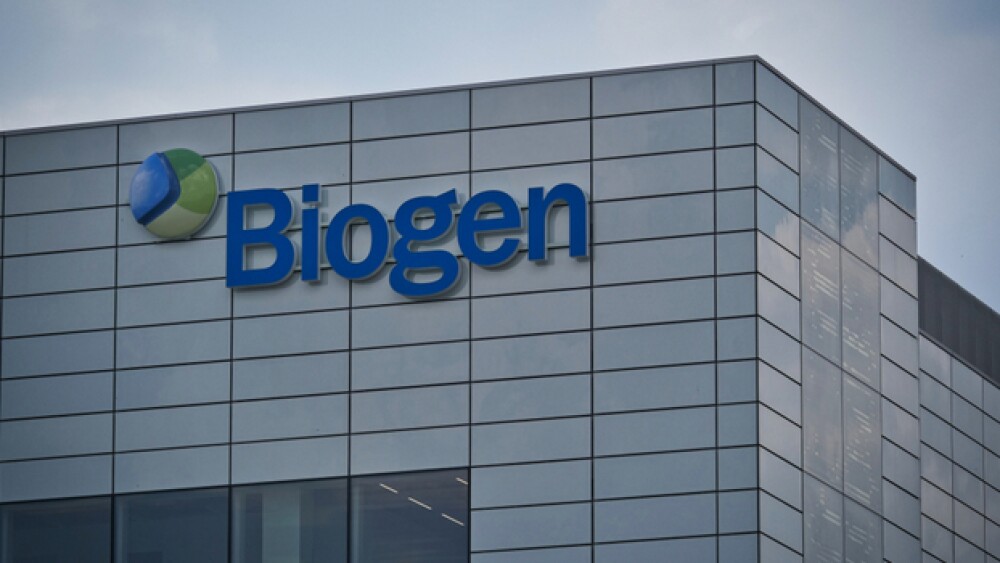During its Q1 earnings call Tuesday, Biogen announced a handful of program pauses and cuts and touted the potential of anticipated approvals.
Pictured: A Biogen building/courtesy of PictureDesignSwiss/shutterstock
Biogen’s new chief executive is attempting to right his battered ship with pipeline pivots and a focus on upcoming money makers. On its Q1 earnings call Tuesday, the company announced a handful of program pauses and cuts and touted the potential of anticipated approvals.
Christopher Viehbacher took the helm in November after Michel Vounatsos was ousted following the controversy and market failure of Biogen’s first Alzheimer’s drug, Aduhelm.
“What we’re really trying to do is redesign the company,” Viehbacher told investors on the earnings call, adding that this could include a migration into immunology for the previously neuroscience-focused company.
Reprioritizing the Pipeline
Historically heavily invested in multiple sclerosis, Biogen started to feel the pinch as cash flow in this space began to dry up. Revenue from its MS products decreased 19% in Q1, 2023, compared to the same period in 2022, the company said on the call.
“The tide is going out on MS and coming in on new products,” Viehbacher said.
In gene therapy, Biogen is deprioritizing some of its preclinical research but not specific pipeline assets, Dan Haro, the company’s global media affairs lead, told BioSpace in an email. Biogen is attempting to de-risk the space by refocusing investments into safer delivery technology, looking beyond AAV gene therapy into both viral and non-viral modalities, he said.
Biogen is parting ways with BIIB093, an investigational therapy in Phase III studies for a type of ischemic stroke and Phase II for brain contusion. The drug was acquired for $120 million from Remedy Pharmaceuticals in 2017. At that time, the therapy was already Phase III–ready and with Orphan Drug and Fast Track designations from the FDA. Remedy has the right to reclaim the asset in the next 30 days.
Biogen also discontinued development of an investigational treatment for spinocerebellar ataxia type 3.
Priya Singhal, executive vice president and head of development at Biogen, said on the call that the common denominator across the pipeline changes is that Biogen’s resources are better applied to other programs. The company “should be spending time elsewhere,” she said.
Gearing Up for Approvals
At the time of the earnings call, Biogen was anticipating PDUFA dates for three different products in 2023. The first was decided later on Tuesday as Qalsody, previously tofersen, won approval in superoxide dismutase 1 (SOD1) ALS. Qalsody is the fourth therapy authorized in the U.S. for the devastating neurodegenerative disease.
The SOD1 ALS market is fairly small, with an estimated 330 cases in the U.S., according to Biogen. Viehbacher is banking on the company’s second Alzheimer’s drug, Leqembi, and depression drug zuranolone, for near-term revenue.
Leqembi, developed in partnership with Eisai, has generated the majority of the buzz for Biogen since its accelerated approval in January 2023. Viehbacher said CMS reimbursement will be the next major milestone.
“We expect to have an answer on that once the product has received full approval as expected following the PDUFA date in July,” he said. He told investors he hopes to build a global footprint for Leqembi by this time next year, with anticipated approvals in Europe and China.
Biogen is also working on regulatory filings for a subcutaneous version of the drug, which would expand convenience and accessibility. The original formulation is administered intravenously. Filing is planned for Q1, 2024, Viehbacher said.
Mizuho analyst Salim Syed shared his predictions for Leqembi’s revenue potential.
“Even using conservative epidemiological data, the total addressable market for all products involved in the space may end up being something in the order of $30 billion,” he told BioSpace in an email.
Aduhelm’s struggles caused Biogen’s shares to take a massive tumble during the summer of 2021. Syed said correct execution of the Leqembi launch will likely cause the stock to correct.
Viehbacher noted that there would be complexities with the launch. Diagnosis is multiplexed with PET scans, lumbar puncture to confirm the presence of amyloid, MRI imaging and then bi-weekly infusions, so capacity is anticipated to be an issue, he said.
Banking on Zuranolone for 2024 Revenue
Due to these potential issues, Viehbacher pointed to zuranolone, a depression drug being developed with Sage Therapeutics, as a more immediate moneymaker. The FDA action date for zuranolone is set for August 5 and would take Biogen into a whole new franchise if approved, he said.
Zuranolone is a once-daily 14-day treatment for major depressive disorder and postpartum depression. Viehbacher highlighted its fast-acting mechanism, saying, “Think about the freedom of knowing that after two weeks, you can stop taking zuranolone.”
He said the product will more quickly contribute to sales growth in 2024 as Biogen sees a much higher market potential for the drug than what’s anticipated on Wall Street. Annual revenue for zuranolone is expected to reach $1.67 billion by 2032 in the U.S., according to GlobalData’s Expiry Model.
Syed said Biogen’s reduction of spending on high-risk programs is a potential step in the right direction. The decisions announced may have a short-term negative impact on its stock, but “getting the company right aligned on its portfolio and spend is something investors would like to see in the medium to longer-term,” he said.
Biogen’s total costs and expenses dropped 7.3% to $2.02 billion in the first quarter of 2023 compared to Q1 2022. The company finished the quarter with about $6 billion in cash.






